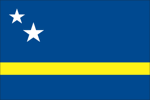Compare
Brazil
to
Curacaoto
CuracaoBrazil consumes 0.5376 gallons of oil per day per capita while Curacao consumes 20.5926
This entry is the total oil consumed in gallons per day (gal/day) divided by the population. The discrepancy between the amount of oil produced and/or imported and the amount consumed and/or exported is due to the omission of stock changes, refinery gains, and other complicating factors.
Source:
CIA World Factbook
Curacao has an unemployment rate of 13.00% while Brazil has 4.80%
This entry contains the percent of the labor force that is without jobs.
Source:
CIA World Factbook
The per capita consumption of electricity in Brazil is 2,249kWh while in Curacao it is 6,592kWh
This entry consists of total electricity generated annually plus imports and minus exports, expressed in kilowatt-hours. The discrepancy between the amount of electricity generated and/or imported and the amount consumed and/or exported is accounted for as loss in transmission and distribution.
Source:
CIA World Factbook
The GDP per capita in Curacao is $15,000 while in Brazil it is $12,100
This entry shows GDP on a purchasing power parity basis divided by population as of 1 July for the same year. A nation's GDP at purchasing power parity (PPP) exchange rates is the sum value of all goods and services produced in the country valued at prices prevailing in the United States. This is the measure most economists prefer when looking at per-capita welfare and when comparing living conditions or use of resources across countries. The measure is difficult to compute, as a US dollar value has to be assigned to all goods and services in the country regardless of whether these goods and services have a direct equivalent in the United States (for example, the value of an ox-cart or non-US military equipment); as a result, PPP estimates for some countries are based on a small and sometimes different set of goods and services. In addition, many countries do not formally participate in the World Bank's PPP project that calculates these measures, so the resulting GDP estimates for these countries may lack precision. For many developing countries, PPP-based GDP measures are multiples of the official exchange rate (OER) measure. The differences between the OER- and PPP-denominated GDP values for most of the wealthy industrialized countries are generally much smaller.
Source:
CIA World Factbook
285 in every 100,000 people are currently imprisoned in Curacao compared to 289 in Brazil
This entry contains the number of people in penal institutions, including pre-trial detainees. Comparability is hampered by differences in local practice, including whether psychiatrically ill offenders are under the authority of the prison administration. People held in a form of custody not under the authority of a prison administration are not included in this figure.
Source:
International Centre for Prison Studies
 With its 146,836 people, Curacao is the
186th largest country in the world by
population. It is the 195th largest country in the
world by area with 444 square kilometers.
With its 146,836 people, Curacao is the
186th largest country in the world by
population. It is the 195th largest country in the
world by area with 444 square kilometers.
Originally settled by Arawak Indians, Curacao was seized by the Dutch in 1634 along with the neighboring island of Bonaire. Once the center of the Caribbean slave trade, Curacao was hard hit economically by the abolition of slavery in 1863. Its prosperity (and that of neighboring Aruba) was restored in the early 20th century with the construction of the Isla Refineria to service the newly discovered Venezuelan oil fields. In 1954, Curacao and several other Dutch Caribbean possessions were reorganized as the Netherlands Antilles, part of the Kingdom of the Netherlands. In referenda in 2005 and 2009, the citizens of Curacao voted to become a self-governing country within the Kingdom of the Netherlands. The change in status became effective in October 2010 with the dissolution of the Netherlands Antilles.
Check out the recommended reading list below for great sources of information on Curacao